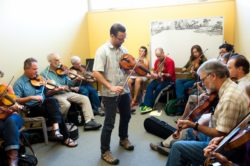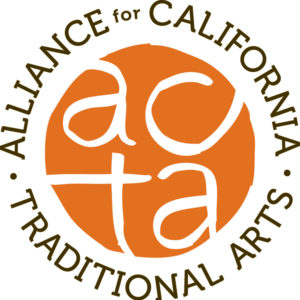 According to BOTMC, old time music combines Anglo, African-American, and Native American traditions to create a uniquely American vernacular art form. This music originally developed in the rural areas of the southern Appalachians, but as people have gradually left the countryside to seek work in the city, old-time music increasingly takes place in urban settings. The tracks below are yours to download to your personal library, with the compliments of the artists. Feel free to share it with others.
According to BOTMC, old time music combines Anglo, African-American, and Native American traditions to create a uniquely American vernacular art form. This music originally developed in the rural areas of the southern Appalachians, but as people have gradually left the countryside to seek work in the city, old-time music increasingly takes place in urban settings. The tracks below are yours to download to your personal library, with the compliments of the artists. Feel free to share it with others.
As you listen, consider what you make possible when you donate to ACTA. You can help us support organizations like BOTMC. You can nurture vibrant cultural communities. You can make California a better place for all of us.
It is easy to donate. Any amount is profoundly appreciated.
Donate to ACTA
Three Way Hornpipe
This piece is a cross-generational, cross-continental collaboration between musicians from Tennessee and California, featuring master fiddler Mike Bryant with his former apprentice, Joseph Decosimo, on banjo; both are from Tennessee. They are joined by San Francisco guitarist Karen Celia Heil. Karen first met and performed with Mike and Joseph at the BOTMC, and has since recorded three critically acclaimed CDs and toured in the U.S. and Europe as part of Joseph’s band, the Bucking Mules.
Their rendition of Three Way Hornpipe, a dance tune (which is not actually a hornpipe) learned from Tennessee fiddler John Sharp Sr., is a perfect example of the mesmerizing, trance-like feeling that is emblematic of old-time fiddle music. Old time dance fiddling does not feature solos, and privileges rhythm and ensemble playing over virtuosity. The fiddle and banjo play the melody together, steam-roller style, over and over and over without much variation.
Much like chanting in various types of spiritual practices, these hypnotic repetitions create a shared creative experience in which the self becomes subsumed into a larger entity.

 ACTA
ACTA
 According to BOTMC, old time music combines Anglo, African-American, and Native American traditions to create a uniquely American vernacular art form. This music originally developed in the rural areas of the southern Appalachians, but as people have gradually left the countryside to seek work in the city, old-time music increasingly takes place in urban settings. The tracks below are yours to download to your personal library, with the compliments of the artists. Feel free to share it with others.
According to BOTMC, old time music combines Anglo, African-American, and Native American traditions to create a uniquely American vernacular art form. This music originally developed in the rural areas of the southern Appalachians, but as people have gradually left the countryside to seek work in the city, old-time music increasingly takes place in urban settings. The tracks below are yours to download to your personal library, with the compliments of the artists. Feel free to share it with others.
